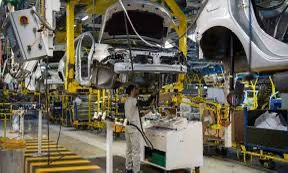Morocco Doubles Down on Electric Vehicle Industry: Aims for 60% of Total Production by 2030

ALDAR/
Morocco continues to consolidate its position as one of the world’s leading players in the automotive industry. The Kingdom has embarked on an ambitious plan to raise its annual production capacity to one million vehicles by the end of 2025 — a remarkable leap compared to recent years.
This strategic direction reflects Morocco’s desire to solidify its role as an advanced industrial hub, especially as the automotive sector has become the country’s top export sector, surpassing phosphates and agricultural products. In 2023, automotive exports exceeded $14 billion, with production maintaining a pace of 700,000 units annually, mainly distributed between the Renault factory in Tangier and Stellantis in Kenitra.
Morocco’s bet goes beyond numbers — it’s also about the quality of production. The country is rapidly moving toward integrating electric vehicles (EVs) into its manufacturing lines, in line with the global shift toward clean energy. Within this trajectory, the number of EVs produced in the country is expected to double to reach 100,000 units annually by mid-decade, with projections indicating that EVs will account for 60% of total vehicle production by 2030.
This industrial expansion would not have been possible without the advanced infrastructure Morocco has invested in over the past two decades — most notably the Tangier Med Port, now one of the most important export gateways to the European market. Additionally, designated industrial zones like “Tangier Automotive City” and the Kenitra area have helped attract major global manufacturers. Local content integration has also exceeded 60%, with plans to raise it to 80% within two years.
Crucially, Morocco’s shift toward local production of electric batteries marks a strategic turning point. The country has signed major agreements with leading Chinese groups to establish gigafactories with investments exceeding $1 billion — a move that will bolster Morocco’s industrial sovereignty in this vital sector. These steps reflect the Kingdom’s new industrial vision, based on technological diversification and enhanced competitiveness.
At the same time, Morocco benefits from its ideal geographic location, allowing it to export vehicles to Europe in less than 72 hours — making it a preferred option for manufacturers seeking to cut costs and delivery times. In fact, in 2023, Morocco ranked among the top suppliers of cars to the European market, outperforming even some traditional Asian manufacturing countries.
Since 2014, Morocco has created over 220,000 direct jobs in the automotive sector, and future plans indicate even greater growth potential — especially with the Kingdom entering the race to manufacture clean vehicles, which represent the future of the global industry. One of the key hallmarks of this experience is the balance between encouraging foreign investment and developing local suppliers, giving Morocco’s automotive industry a holistic and sustainable character over the long term.
At this accelerating pace, Morocco seems well on its way to becoming a leading regional hub in the automotive industry — not only assembling vehicles but also actively shaping the technological future of the sector on a global scale.





